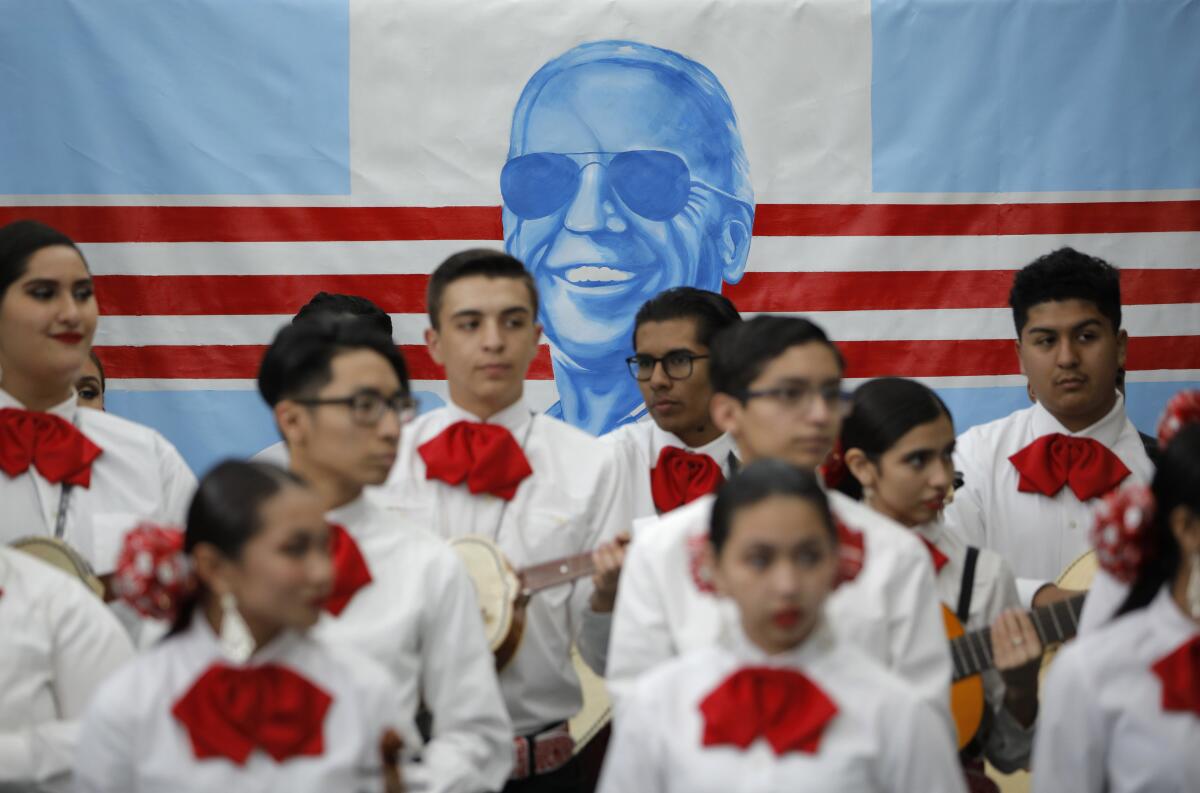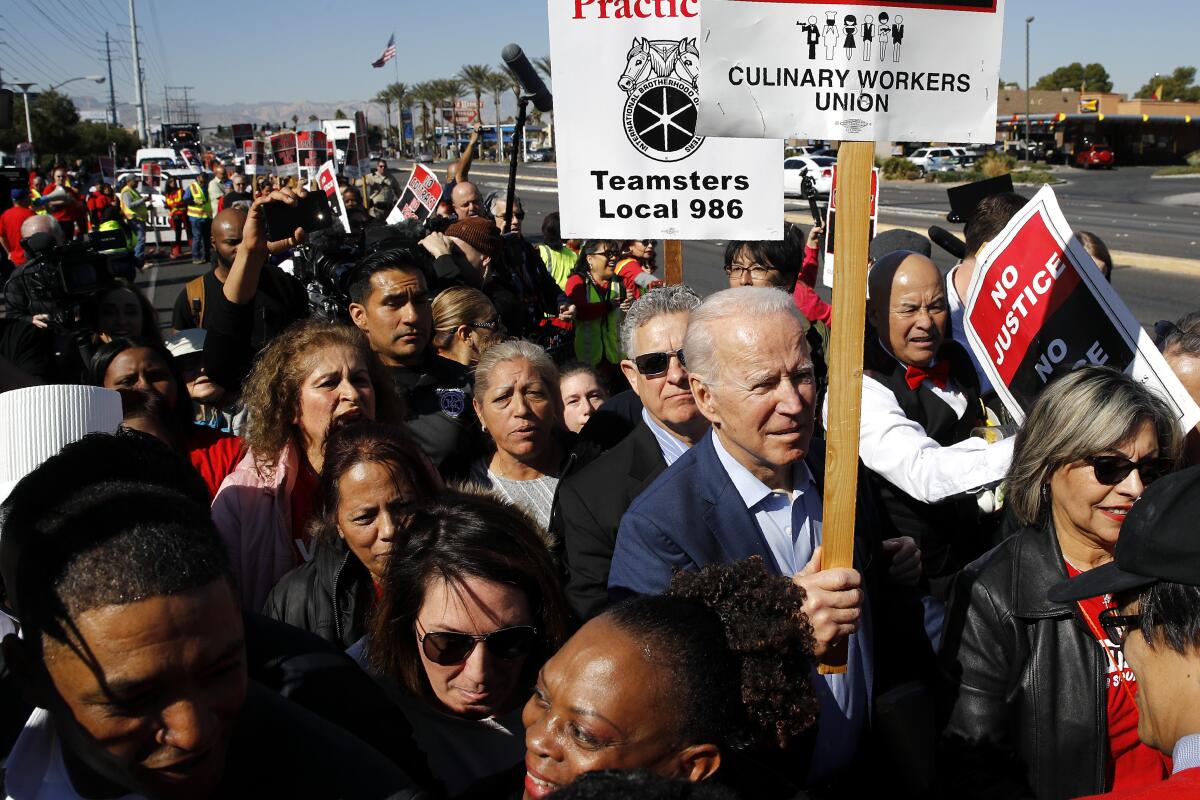Column: The Corrido of ‘Amigo’ Biden: How the presidential candidate finally got his Mexican ballad
- Share via
For over 200 years, the Mexican corrido has told stories of derring-do about heroes and villains and hero-villains galore.
The ballad form naturally carried over to the United States, and eventually caught on to American politics, where heroes and villains (and hero-villains) rule. JFK got dozens to mark his assassination; one hailed Jimmy Carter as the “peanut king.”
La Hillary earned some too, including “El Corrido de Hillary Clinton,” a lazy effort released in 2016 by ranchera icon Vicente Fernandez that repurposed an old hit of his to tell fans to vote for Clinton.
And we all know how that turned out. Oh, she got the popular vote. But apparently Chente never heard of el electoral college.
President Trump has appeared in a few, inevitably cast as a bad hombre — and not in a cool way. Tio Bernie? A jammin’ one called “El Quemazón” (“The Bern”).
But Uncle Joe Biden? He just doesn’t inspire the same feelings among Latinos — whether hatred or love — as Trump or Sanders.

So he was left largely corrido-less until the Diaz brothers decided to do something about it.
And the way they put together “La Señal es Joe y Kamala” (“The Signal Is Joe and Kamala”) was so Los Angeles circa 2020:
Take two natives of Watts — David’s a music producer, Elvis is a political science undergrad at Columbia University.
Throw in a songwriter based in Chiapas, the southernmost state in Mexico.
Find a norteño band in Las Vegas to record the track.
Have them debut it at a nightclub in small-town Georgia.
Release it on YouTube.
“La Señal” by La Nueva Onda Norteña starts with a flourish of notes plucked off a bajo sexto (12-string guitar) by singer Selwyn Gonzalez. As images drawn from Biden’s career flash on a screen behind the band, Gonzalez croons out what a vote for the Democratic presidential candidate would bring to Latinos: Respect. Hope. Walls that tumble down.
“The signal/I see the signal,” the song’s chorus proclaims. “Of a new era/Of a change for real.”
Strangely, the easy villain for such a tale is nowhere to be found. Trump is not even mentioned.
Instead, La Nueva Onda Norteña’s swaying song offers something absent in electoral politics these days: optimism.

The expectations for “La Señal” are modest for David, who spent about $1,500 of his own money to produce it.
“If we change the mind of one person, I’ll be happy,” said the 28-year-old via phone from Mexico. “But hopefully, it changes millions.”
At fewer than 4,000 YouTube hits, it probably won’t. Elvis sent the song to Biden’s team, which hasn’t responded; instead, they used songs by Vicente Fernandez’s son, Alejandro, and reggaetón superstar Bad Bunny to score campaign commercials.
But the corrido does show how this election has inspired Mexican American men who previously didn’t care for American politics to jump into the fray.
Those who have gravitated toward Trump because of a sense that he’s a macho’s macho are getting mucho media attention. But the Diaz brothers and La Nueva Onda Norteña represent the silent majority of these señores: men who care for their family and community and long saw their ceaseless work, not elections, as the way forward for Latinos.
Until now.
It’s also an inadvertent call-out to the modern-day Mexican regional music industry in the United States, which has a surprisingly long history with American presidential campaigns beyond merely chronicling them. Mariachis serenaded JFK the night before his death, and Richard Nixon at his 1973 inauguration gala. Ranchera legend Antonio Aguilar was a friend of Ronald Reagan. Vicente Fernandez even performed at the 2000 Republican National Convention.
Today? The industry finds it easier to praise avarice and any number of narco lords than American democracy. Or democracy, period.
“We Mexicans all have a friend who was born here but doesn’t want to vote,” Gonzalez said. “That it doesn’t matter. But we need them to get conscious.”
“Before this, my interest in politics was zero,” admitted David. “But we need a change. Something different from what Trump is doing. And I needed to do something.”
**

David takes pains to differentiate himself from Elvis — the brother, not the King. “He’s more on the side of smartness,” he said. “He goes to Columbia. Me, I’m more the streets. I know Mexican music.”
Elvis, a 30-year-old who has worked for the Thai and Peruvian consulates in the United States and as a speechwriter for Mozambique’s ambassador to the United Nations, never bothered talking politics with his younger brother.
“He’s a businessman, and doesn’t want to lose any potential income,” Elvis said. “But we all need to participate this year.”
Knowing the social buzz that the Bernie Sanders corrido earned during the 2016 Democratic presidential primaries, Elvis pitched his idea to his brother. After a couple of deep talks, David agreed.
“People don’t understand the power of a vote until it affects them,” he said. “And this election definitely will.”
David reached out to a previous collaborator, Hunab Mandujano. Even though he’s based in Chiapas, the 28-year-old was “happy and excited” to write something about Biden.
“We [in Mexico] know about what’s going on up there, and the racist language Trump uses, and not just about Mexicans,” Mandujano said. The Diaz brothers offered only one suggestion: Don’t focus on Trump, because that corrido market was already full of songs that ranted the president is “crazier than a goat” . Or a “pinche payaso” in another. And those are the insults we can print.
“Look, I’m into marketing,” David said. “All that [trash]-talking on Trump helps him.”
He’s right. Because if you’ve heard one anti-45 corrido or Facebook screed, for that matter, you’ve heard them all. Obsessive hate offers no way forward other than to hate some more.
Instead, David said he “wanted us to show positivity.”
So Mandujano read articles about Biden and heard his speeches, and delivered something within a week.
His ultimate inspiration?
“Joe’s smile,” Mandujano said. “He’s also a more analytical person and firmer [than Trump]. And he can do a lot of good for the American project.”
The Diaz brothers then sent “La Señal” to Gonzalez, who admitted it was initially “a bit of a challenge” to figure his way musically around the subject. His group is more used to singing love songs.
“Politics is a subject that can bring you a lot of repercussions, good or bad,” Gonzalez said.
But the American-born 30-year-old reflected on his parents, former undocumented immigrants. He thought of Nevada, a formerly deep-red state where Latinos are now a swing vote. And so he sang “La Señal” with “those feelings” in mind. The singer got so into it, that he ad-libbed in Spanish “Now, let’s go out to vote for the amigo Biden — hell ya!” halfway through the tune.
“It has a lot of the qualities of what makes a good campaign song,” said Dana Gorzelany-Mostak, music professor at Georgia College. She studies the use of songs in presidential campaigns. “You have to have the marriage of inspirational lyrics, good music, and great hooks. It has an exuberance to it. Even if you don’t know the language, you get the emotions.”
The plan was to debut “La Señal” in time for Gonzalez and his bandmates to play a live concert while Biden visited Nevada earlier this month. But “the timing just didn’t work out,” and a tour for La Nueva Onda Norteña across the South was forthcoming.
So the song debuted in a club in Moultree, Ga., a city of about 14,000 in southern Georgia near a major chicken-processing plant. Gonzalez said the audience was mostly Salvadorans and Guatemalans, but “they liked it.”
The club promoter, on the other hand …
“He was at first like, ‘What was up with that corrido?’” he said. “He was nervous about being seen as political. But there’s always a first time for something.”
More to Read
Sign up for Essential California
The most important California stories and recommendations in your inbox every morning.
You may occasionally receive promotional content from the Los Angeles Times.











